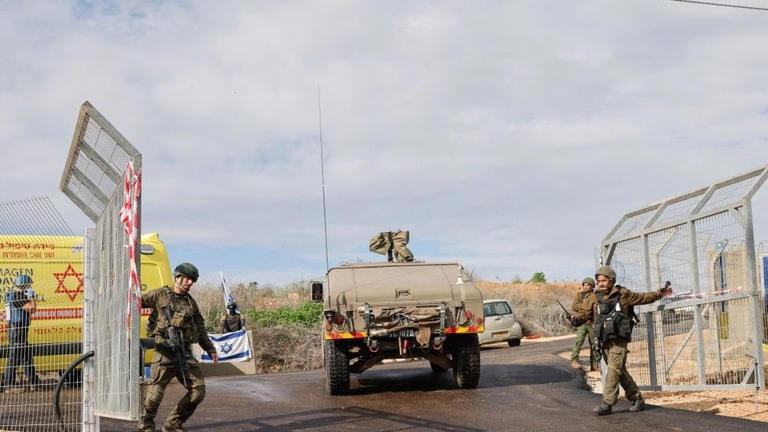
Hezbollah missile attack kills Israeli woman and son
An elderly Israeli woman and her son have been killed in a Hezbollah missile attack from Lebanon, Israel says.
The anti-tank missile hit the town of Kfar Yuval on Israel’s northern border, killing Barak Ayalon, 45, and his mother Miri Ayalon, 76.
Earlier the Israeli military said it killed four gunmen trying to cross from Lebanon into Israel.
It comes as Hamas health officials in Gaza said 125 more people had been killed in continuing Israeli strikes.
That brings the number of deaths in Gaza since Israel began retaliatory attacks on the Strip to nearly 24,000, with thousands more believed dead under rubble. Local officials say children and women account for about two-thirds of the dead. About 60,000 people have been injured.
Meanwhile US National Security Council spokesman John Kirby said that Israel would have to transition to lower-intensity operations in Gaza.
He said that in a military campaign, tactics evolve as objectives are reached, and that the US had offered assistance in sharing knowhow.
Israel began striking Gaza after Hamas attacked southern Israel on 7 October, killing about 1,300 mainly civilians and taking 240 more hostage.
Since then Hezbollah and Israel have also traded regular fire across Israel’s northern border.
In Kfar Yuval, Barak Ayalon was part of the town’s emergency response squad. Israeli media say his father was also seriously injured in the Hezbollah attack.
The Israel Defense Forces (IDF) said the Hezbollah guided missiles targeted several Israeli communities in the north and the IDF was striking Hezbollah targets in Lebanon in retaliation.
Hezbollah leader Hassan Nasrallah said the group’s aim in firing on Israel was to stop the war in Gaza.
He also said the Houthi group in Yemen would continue attacking shipping in the Red Sea and that US and UK attacks on the group had been a mistake.
The US should understand “that the security of the Red Sea and calm on Lebanon’s front, the situation in Iraq, and all developments in the region is tied to one thing: to stop the aggression against Gaza”, he said.
In Gaza, Israeli tanks and aircraft continued attacking targets in southern and central areas on Sunday.
Communications and internet services were down for the third day running in parts of Gaza.
Reflecting on the last 100 days of war, a man who was displaced and now resides in the southern city of Rafah, Alaa Bakhit, told AFP news agency: “After 100 days, we are living in this country but we feel like bodies without souls.
“Every second of our life is a moment of war. Every moment and minute that passes, we are in war… There is nothing left in the country, no schools, no universities, no health services, nothing,” he said.
“Think about the future of all these children, how will it be? How can they live after this?”
Others in Gaza said they had no hope of the war ending.
“You cook while being afraid of being hit by an air strike. You go out to buy something from the market and all the prices are really high. Our morals have been shattered, we have no hope of returning back to our homes,” Um Sharif Khalil, who was displaced from the north of Gaza, said.
The Israeli Prime Minister Benjamin Netanyahu reiterated on Saturday that Israel will keep fighting until it has achieved “total victory” over Hamas.
The Israeli military has said the next phase of the war will see more targeted operations against Hamas leaders and positions.
Source » msn





